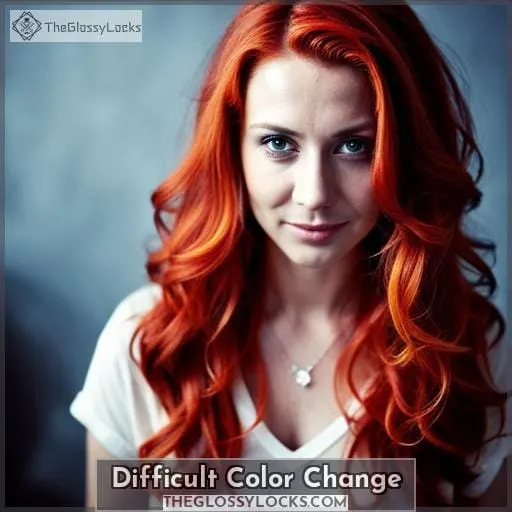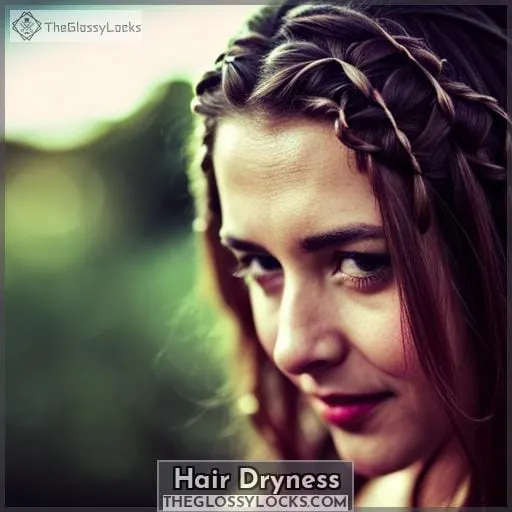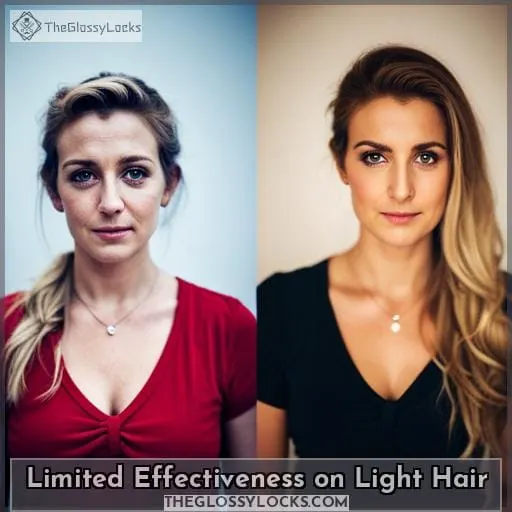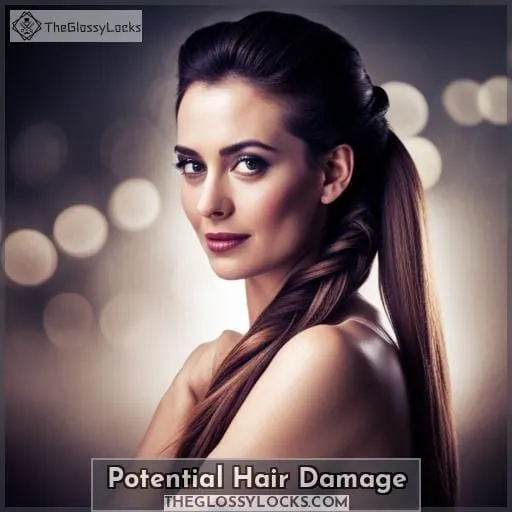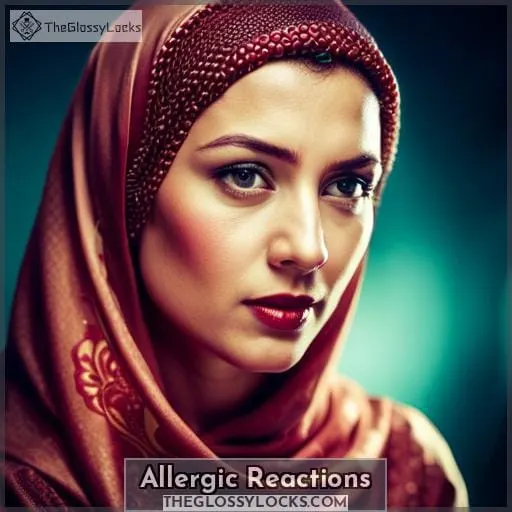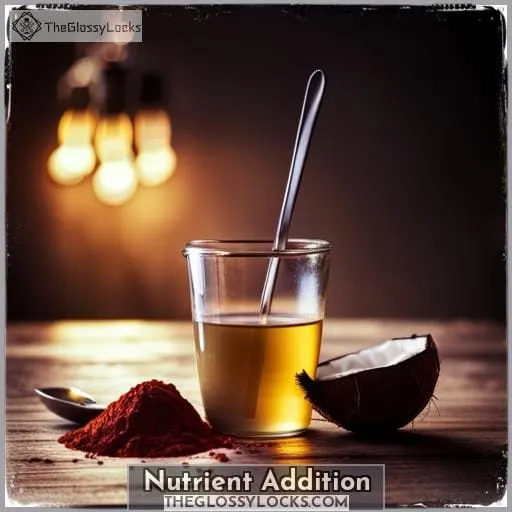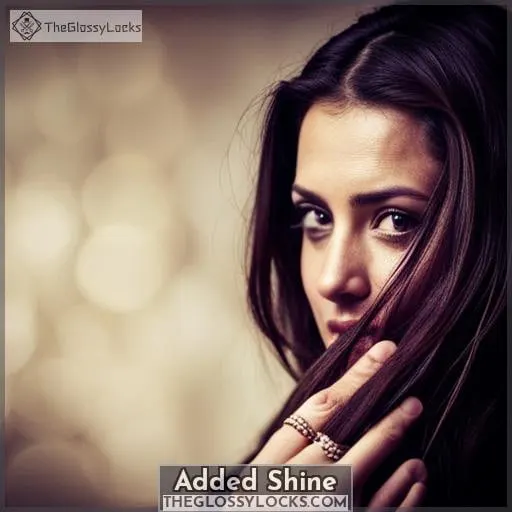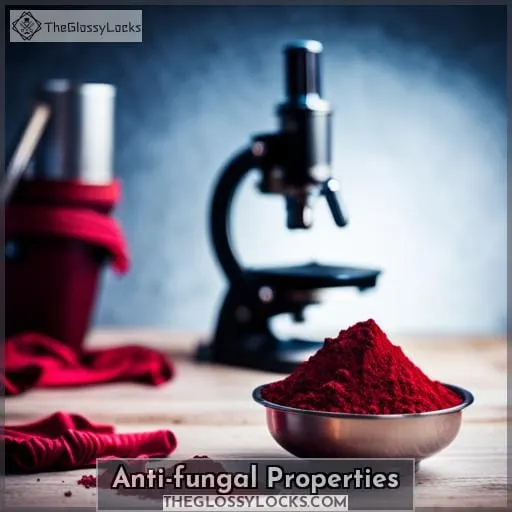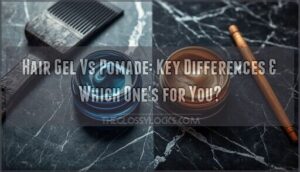This site is supported by our readers. We may earn a commission, at no cost to you, if you purchase through links.

You’ve heard about henna as a natural hair dye option, and you’re intrigued. But before diving in, it’s crucial to understand the potential disadvantages.
When used incorrectly or on certain hair types, henna can lead to hair damage and allergic reactions.
This article will explore the risks associated with using henna on your hair so that you can make an informed decision about whether or not it’s right for you.
Safety first!
Table Of Contents
- Key Takeaways
- Difficult Color Change
- Hair Dryness
- Limited Effectiveness on Light Hair
- Potential Hair Damage
- Allergic Reactions
- Interaction With Metal
- Tricky Application
- Nutrient Addition
- Added Shine
- Anti-fungal Properties
- Frequently Asked Questions (FAQs)
- Can henna hair dye be easily removed or changed if I don’t like the color?
- How can I prevent my hair from becoming dry after using henna hair dye?
- Will henna hair dye work on light hair or is it only effective on dark hair?
- What are the potential risks of hair damage from using henna hair dye incorrectly?
- How common are allergic reactions to henna hair dye and what are the symptoms?
- Conclusion
Key Takeaways
- Difficult color change
- Hair dryness
- Limited effectiveness on light hair
- Potential hair damage
Difficult Color Change
If you don’t like the results, it can be challenging to change your hair color after using henna.
Henna is known for its long-lasting effects and inability to lighten hair, making it difficult to remove or alter once applied. Unlike chemical dyes that can be easily stripped or lightened with other products, henna dye penetrates deep into the cuticle of the hair strand and locks itself in.
Additionally, achieving an even color with henna can be tricky due to its natural variations in pigment concentration and application technique required for optimal results. It’s important to perform a patch test prior to full application as this will help determine if any uneven coloring may occur on individual strands which could lead potentially undesirable outcomes.
Hair Dryness
Now that we’ve discussed the difficulty of changing hair color with henna, let’s move on to another potential drawback: hair dryness.
When used incorrectly or excessively, henna has the potential to leave your hair feeling dry and brittle.
To help you understand this issue better, here are some key points about how henna may contribute to hair dryness:
- Henna doesn’t lighten your hair but instead adds pigment by coating each strand.
- The drying effect of henna can be intensified if you have low-porosity or curly hair.
- Applying multiple layers of henna over time can cause protein buildup on the shafts, making them heavier and less porous while potentially altering your natural curl pattern.
- In rare cases, an allergic reaction may occur which could lead to scalp irritation and redness.
To mitigate these concerns related to dryness when using henna for coloring purposes:
- Prioritize moisturizing conditioners after each use.
- Follow instructions carefully regarding application duration as leaving it on for too long could further exacerbate drying effects.
- Perform a patch test beforehand in order to identify any possible allergies before applying it all over your head
- Opt for high-quality products free from additives like lead that might harm both your health and appearance.
By being aware of these factors associated with potential drying effects caused by improper usage or prolonged exposure without proper conditioning measures taken afterward,you’ll ensure healthier-looking locks even while enjoying vibrant colors obtained through using this popular alternative dye option called ‘hennadye.
Limited Effectiveness on Light Hair
You may find henna to be less effective on light hair. Henna is primarily known for its ability to darken hair, so it may not provide a noticeable color change on lighter shades of hair. This limited effectiveness can be attributed to the natural dyeing properties of henna, which work best on darker pigments.
It’s important to keep this in mind when considering using henna as a hair dye option.
Before applying henna onto your light-colored strands, it’s advisable to conduct a patch test first. This will help determine if your particular shade of light hair will react well with the henna dye and achieve the desired results without any potential health side effects or allergic reactions.
Additionally, it’s crucial that you avoid using black henna as these products often contain harmful chemicals that can cause damage and adverse reactions. Another factor worth noting is that metal objects such as bowls or utensils shouldn’t come into contact with the henna mixture since they may react with certain compounds present in the dye.
Ultimately, while there are limitations regarding its effectiveness on light hair, conducting proper tests and avoiding unsafe practices can help ensure better outcomes when using natural plant-based dyes like Henna.
Potential Hair Damage
Be cautious of the potential for hair damage when using henna, as incorrect application can lead to brittle and breakage-prone strands.
One of the main causes of hair damage from henna is protein build-up. When henna is applied repeatedly without proper care and maintenance, it can cause a build-up of protein on the hair shafts. This build-up makes the hair heavier, less porous, and may result in a loss of its natural curl pattern.
Additionally, if you have an allergic reaction to henna or use black henna which contains harmful chemicals like paraphenylenediamine (PDD), it can further contribute to damaged hair and even lead to significant hair loss.
To avoid these issues, always perform a patch test before using any type of henna dye on your entire head.
Allergic Reactions
Experiencing an allergic reaction to henna hair dye can cause skin irritation, swelling, and hives.
While henna is generally considered safe for most people, there are cases where individuals may develop an allergic response to it. Allergic reactions occur when the immune system perceives substances in the henna as harmful and triggers a defensive response.
This can lead to various symptoms such as redness, itching, rashes, or even difficulty breathing in severe cases.
Black henna poses a particular danger as it often contains chemicals like paraphenylenediamine (PPD), which is known to cause severe allergies and skin sensitization. It’s crucial to perform a patch test before using any type of henna product on your hair or skin.
In rare instances where an allergic reaction occurs after applying black or regular HENNA dye , immediate medical attention should be sought. In some situations this could happen because you have porous hair that easily absorbs foreign substances such as those found in HENNA dyes.
Another possible side effect associated with using HENNA dyes is experiencing excessive dryness leading up until fall out.
Interaction With Metal
When using henna hair dye, it’s important to be aware that it can interact with certain metals, potentially causing the dye to turn green or blue.
This interaction occurs due to a chemical reaction between the natural compounds in henna and metal ions present in jewelry or other hair accessories. The presence of these metals can alter the color of your hair after applying henna, resulting in an unexpected shade.
Additionally, if you have metal jewelry on while applying henna, it may cause an allergic reaction on your skin where contact is made.
Moreover, prolonged exposure of your hair to metal through repeated use of metallic combs or clips when using henna may lead to brittleness and breakage over time.
Furthermore, henna has been known for its ability to relax curls so consistent usage might result in loosening up natural curl patterns.
Therefore, it is advised not to wear any metal accessories during the application process and avoid combining hairs dyes containing metallic salts with henna as this could produce unpredictable results.
Tricky Application
Are you finding it challenging to apply henna evenly and achieve a consistent hair color?
Tricky application is one of the disadvantages of using henna as a hair dye. The process requires precision and attention to detail in order to avoid patchy or uneven results.
One common issue with applying henna is staining, where the dye may transfer onto your skin or clothing during the application process. Additionally, if left on for too long, henna can harden and become difficult to rinse out properly, leading to potential damage when trying to remove it from your hair.
It’s also important not only for achieving an even color but also for preventing allergic reactions that you perform a patch test before applying henna all over your scalp. This will help identify any potential allergies or sensitivities beforehand and ensure a safer coloring experience overall.
Nutrient Addition
Moving on from the tricky application of henna, let’s now explore the benefits it offers in terms of nutrient addition.
When applied to your hair, henna not only imparts color but also nourishes and improves its condition. One significant advantage is that it adds shine to your locks, giving them a lustrous and healthy appearance.
Additionally, henna possesses anti-fungal properties that help protect your scalp from dandruff and other infections.
Furthermore, using henna may aid in slowing down the graying process of your hair. It contains natural compounds that can potentially delay premature graying by providing essential nutrients to the hair follicles.
Moreover, apart from its cosmetic benefits for hair health and appearance mentioned earlier, there are claims suggesting that applying henna may have Ayurvedic health benefits as well.
However beneficial these aspects might be for some individuals seeking healthier-looking tresses with added shine or addressing specific concerns like fungal infections or graying issues through more natural means – keep in mind one drawback: once applied on hair strands; HENNA IS DIFFICULT TO REMOVE.
Added Shine
To achieve added shine to your hair, henna can be a beneficial option. Here are three reasons why henna is known for its ability to enhance the shine of your tresses:
- Henna forms a protective coating on each hair strand, which reflects light and gives it a glossy appearance.
- The natural pigments in henna bind with the keratin protein in your hair, creating vibrant and shiny color that lasts longer than chemical dyes.
- Henna’s conditioning properties help to moisturize and nourish the hair shaft, making it smoother and more reflective.
However, there are some considerations when using henna for added shine:
- It may alter curly hair by loosening or relaxing the curls due to its strengthening effect on the strands.
- Keep in mind that henna can’t be used as a lightening agent; it can only darken or add richness to existing color.
- Be careful during application as henna can leave stains on your skin if not properly protected before dyeing process begins..
Overall, having patience while trying to correct uneven coloring from previous applications is crucial. Hence, sit tight with patience and carefully scrap off the old henna color before reapplying in order achieve desired results for added shine.
Anti-fungal Properties
Protect your hair from dandruff and other scalp infections with henna’s anti-fungal properties.
Henna contains natural compounds that have been found to possess antifungal activity, making it effective in combating fungal growth on the scalp. This can help prevent conditions such as dandruff, ringworm, and other fungal infections that can cause itchiness, flaking, and discomfort.
The antifungal properties of henna are attributed to its active constituents like lawsone and tannins.
| Anti-Fungal Properties |
|---|
| Prevents dandruff |
| Combats ringworm |
| Reduces fungal |
| infections |
It is important to note that while henna’s anti-fungal properties can be beneficial for maintaining a healthy scalp environment, there may be potential drawbacks associated with its use. Henna has the potential to interact with metal components in hair products or utensils during preparation or application processes.
Additionally, it’s essential to ensure you’re using quality products free from harmful additives.
Furthermore, some individuals may experience adverse reactions such as hair fall out or potential health side effects when using henna dye. Lastly, it should also be noted that certain types of hennas might lighten the color of your hair upon application due to their bleaching effect.
Frequently Asked Questions (FAQs)
Can henna hair dye be easily removed or changed if I don’t like the color?
Henna hair dye is difficult to remove or change if you don’t like the color. Its permanent nature makes it challenging to alter without damaging your hair.
How can I prevent my hair from becoming dry after using henna hair dye?
To prevent dryness after applying henna hair dye, ensure your hair is moisturized by using a conditioner specifically designed for dry or damaged hair.
Will henna hair dye work on light hair or is it only effective on dark hair?
Henna isn’t effective on light hair as it doesn’t produce a noticeable color change.
It works best on dark hair, providing a rich and vibrant color.
What are the potential risks of hair damage from using henna hair dye incorrectly?
Incorrect application of henna hair dye can lead to hair damage.
For example, if you leave the henna on for too long or apply it unevenly, your hair may become brittle and break.
It’s important to follow the instructions carefully to avoid these risks.
How common are allergic reactions to henna hair dye and what are the symptoms?
Allergic reactions to henna hair dye are relatively uncommon, but they can occur.
Symptoms may include:
- Skin irritation
- Redness
- Swelling
- Hives
If you experience these symptoms after using henna hair dye, seek medical attention promptly for proper diagnosis and treatment.
Conclusion
To conclude, it’s important to consider the potential disadvantages of using henna on your hair.
While henna can provide a natural alternative for hair dye, it may not be suitable for everyone.
- Difficult color change
- Hair dryness
- Limited effectiveness on light hair
- Potential hair damage
Additionally, allergic reactions and the interaction with metal can pose further challenges.
[Keypoints]However, henna does offer benefits such as:
- Nutrient addition
- Added shine
- Anti-fungal properties
It’s crucial to weigh these factors before deciding if henna is right for you.

